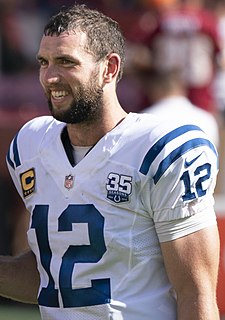
Indianapolis Colts quarterback Andrew Luck recently sent shockwaves through the sports world with the announcement of his early retirement after only six seasons in the league.
Luck took advantage of his platform bringing attention to an often unspoken issue among NFL players: mental health.
“I feel tired,” Luck said during his retirement speech. “Not just tired in the physical sense.” He held back tears during his final press conference with the Indianapolis Colts, in which he cited his extreme and repeated physical injuries as his main reason for leaving the game of football as well as the desire to focus on raising his family.
Football experts regarded Luck — Stanford graduate and the first overall selection in the 2012 NFL Draft — as one of the greatest quarterbacks to play in recent history: a future Hall-of-Famer. His arm strength, split-second decision-making, leadership on the field, unparalleled sportsmanship, and deep devotion to the game made him one of the league’s favorite personalities.
In a 2018 article published in the Harvard Journal of Law and Public Policy, an ex-NFL player speaking anonymously said, “The reason it’s so lonely is we put those walls up… and nobody can know that I’m feeling concerned about my performance, that I’m insecure about this or that because football, in a sense, is ultimate meritocracy and such a manly thing that you just you always feel like you gotta be on, you know?”
The NFL recently made an attempt to address potential mental health issues that players face.
The Players Association of the NFL drafted an initiative that would require every team in the league to have a mental health professional on staff. Players will be required to spend 8-12 hours at the team mental health facility, according to a May 2019 press release. The initiative would also establish a mental health and wellness committee that would develop educational materials that players would have access to, if in need.
While these projects are a great step towards improving the mental health of professional athletes, there is an even greater underlying problem that no press release or publicized initiative can solve.
Luck sat out for the entirety of the 2017 season, nine games in 2015, and multiple games in the rest of his six year career with the Colts. His career list of injuries includes tearing cartilage near two of his ribs, lacerating a kidney, tearing a muscle in his abdomen, tearing his right labrum, chronic calf strains with lingering pain, and multiple concussions.
For someone who relies on the wellbeing of his body to continue doing what he loves and what he is paid to do, a string of misfortunes as long as Luck’s would take a hefty toll on their mental health.
While most of Luck’s fans or the NFL as a whole can respect the decision of a young star to step away from the game to avoid a similar fate, he has faced explosive and unwarranted backlash from many. Negative reactions ranged from angry social media posts to audible booing from those who formerly called themselves fans.
NFL fans must realize that players are people too.
Being handed millions of dollars during or directly after college, as well as being placed on one of the largest public stages, and faced with the pressure that comes with being some of the most physically-gifted humans in the world, NFL players have a lot on their plate. It can create an immense amount of mental strain in young people that puts them at an increased risk of depression, on top of the risk of permanent brain and body damage.
Anyone who professes to be a better-or-worse fan of the NFL and its players should embrace early retirements and celebrate the stars for the great years they gave us. Andrew Luck was drafted shortly after the Colts lost legendary Peyton Manning. He carried the team to the playoffs three years in a row immediately after being drafted, passed for more than 23,000 yards, 171 touchdowns, and was awarded the Comeback Player of the Year Award in 2018.
Someone who contributed so much to a franchise and the league as a whole should never be booed out of a stadium for making the decision to repair and preserve his mental and physical health.

